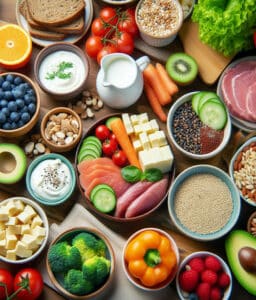Eggs - how healthy or unhealthy are they?
Eggs are highly nutritious and rich in vitamins, minerals, antioxidants, protein and fat.
However.
Many people have heard that eating too many eggs is unhealthy because the cholesterol in egg yolks contributes to heart disease, the leading cause of death in Europe and worldwide.
This view has been promoted for years by health officials and medical and nutritional associations, urging us to avoid eating eggs – no more than 7 eggs a week were recommended.
Eggs undoubtedly contain higher levels of cholesterol than many other foods. However, they also have many beneficial bioactive compounds and other nutrients that we need to grow and regenerate our bones, teeth, skin and organs, to help us fight disease, etc.
Recent studies show that the link between eating eggs and an increased risk of heart disease is not as strong as previously thought, because:
- Dietary cholesterol has little effect on blood levels of total and “bad” LDL cholesterol because the majority of cholesterol in our bodies does not come from our diet – it is produced in our liver.
- Eggs are usually eaten with other foods high in salt, saturated fat and cholesterol, such as bacon etc. It is known that saturated fat can contribute to the production of cholesterol in the liver. In other words, saturated fat consumption should be limited, not egg consumption.
Nutritional value of eggs
Eggs are one of the most nutrient-dense foods and are widely used in a large variety of dishes.
It will be difficult to find another product that contains such an ideal blend of nutrients. In addition to high-quality protein, eggs are naturally rich in vitamin D, group B vitamins, iodine, selenium and many other vitamins and minerals.
Small egg (48 g) | Medium egg (58 g) | Large egg (68 g) | Very large egg (78 g) | Average per 100 g | |
Energy kcal | 54 | 66 | 78 | 90 | 131 |
Energy kJ | 227 | 277 | 326 | 377 | 547 |
Protein (g) | 5.2 | 6.4 | 7.5 | 8.7 | 12.6 |
Carbohydrates (g) |
|
|
|
| 0.96 |
Fat (g) | 3.7 | 4.6 | 5.4 | 6.2 | 9.0 |
Saturated fatty acids (g) | 1.0 | 1.3 | 1.5 | 1.7 | 2.5 |
Monounsaturated fatty acids (g) | 1.4 | 1.7 | 2.0 | 2.4 | 3.4 |
Polyunsaturated fatty acids (g) | 0.6 | 0.7 | 0.9 | 1.0 | 1.4 |
Salt (g) | 0.16 | 0.20 | 0.23 | 0.27 | 0.39 |
Key vitamins.
| Quantity in 1 medium egg (58 g) | % NRV* |
Vitamin A | 64mcg | 8% |
Vitamin D | 1.6mcg | 32% |
Vitamin B2 (Riboflavin) | 0.25mg | 18% |
Vitamin B12 | 1.4mcg | 56% |
Vitamin B9 (Folate) | 24mcg | 12% |
Vitamin B7 (Biotin) | 10mcg | 20% |
Vitamin B5 (Pantothenic acid) | 0.7mg | 12% |
Choline | 144mg | 36%** |
Key minerals.
| Quantity in 1 medium egg (58 g) | % NRV* |
Phosphorus | 91mg | 13% |
Iodine | 25mcg | 17% |
Selenium | 12mcg | 22% |
*NRV – Nutrient Reference Value – used for labelling in Europe and the UK.
**Adequate intake – 400 mg/day for adults (European Food Safety Authority 2016).
For a complete list of vitamins, minerals, etc., in eggs, click HERE.
What is the difference between the white and the yolk of an egg?
A whole egg is one of the most nutritionally complete foods, but the distribution of these nutrients in the white and yolk of the egg is different:
- Egg whites are low in calories and fat. Despite making up the majority of the egg’s volume, egg white contains only about a quarter of the egg’s calories and is virtually fat-free.
- Egg whites are high in protein – they contain more than half of the total protein content of an egg.
- Egg whites are low in vitamins. However, egg whites are high in riboflavin (vitamin B2), which is needed for energy production and cell growth.
- Egg yolks are rich in vitamins. The yolk contains most of the vitamins, calcium, phosphorus and zinc present in the egg. Egg yolks also have about 60% of the daily required amount of choline (based on a 2000-calorie diet) and are rich in fat-soluble carotenoids such as lutein and zeaxanthin.
- Egg yolks are high in fat. The yolk contains almost all the fats found in an egg – many monounsaturated fats, which help maintain normal blood cholesterol levels, and polyunsaturated fats, including omega-3 fatty acids, which are needed for normal brain function.
- Egg yolks are high in cholesterol. It was once thought to increase the risk of cardiovascular disease. However, recent studies have shown that a high-cholesterol diet (particularly a high consumption of eggs) does not necessarily correspond to high cholesterol levels or an increased risk of heart disease.
9 reasons why we should eat eggs
Eggs are one of the few foods classified as a “superfood” because they are packed with nutrients, some of which are rarely found in the modern diet.
Here are 9 reasons why you shouldn’t exclude eggs from your diet:
- Whole eggs are one of the most nutrient-dense foods – they contain almost all the nutrients we need.
- It is true that eggs are high in cholesterol (around 186 mg per hard-boiled egg), but dietary cholesterol does not necessarily affect blood cholesterol levels or increase the risk of heart disease. However, it should be borne in mind that the reaction to eggs varies from person to person:
- About 70% of people eating cholesterol-rich products do not raise their blood cholesterol levels or raise them only slightly.
- For the remaining 30%, eggs or other sources of cholesterol can cause a significant rise in blood cholesterol. Therefore, people with genetic disorders, such as familial hypercholesterolaemia, may still need to limit their egg intake.
- Eating eggs can raise HDL (‘good’) cholesterol levels, for example – this study found that eating 1-3 eggs every day raised HDL levels by 6-13% over a four-week period in healthy adults. People with higher HDL levels generally have a lower risk of heart disease, stroke and other health problems.
- Eggs are an excellent source of choline (one egg contains more than 100 mg). Although our body also produces choline, the amount is not sufficient to meet all our body’s needs. In other words, choline must also be consumed through food. Choline is very important for us (especially pregnant women) because it is necessary for the formation of cell membranes, for the brain and for the nervous system (necessary to regulate memory, mood, muscle control…).
- Eggs probably reduce the risk of heart disease. It is well known that high levels of LDL cholesterol are associated with an increased risk of heart disease, but not everyone knows that LDL is divided into subtypes based on particle size – there are small, dense LDL particles and large LDL particles. Many studies have shown that people whose blood contains mostly small, dense LDL particles have a higher risk of heart disease than people whose blood contains mostly large LDL particles. Even though eggs tend to raise LDL cholesterol slightly in some people, egg consumption is thought to change the pattern of LDL particles from small, dense LDL (bad) to large LDL, which is associated with a lower risk of heart disease. But more research is needed to say this for sure.
- Eggs contain lutein and zeaxanthin, powerful antioxidants that accumulate in the retina and are very important for eye health (can help prevent macular degeneration and cataract). For example, this study found that eating 1 egg daily for 5 weeks increased lutein levels in the blood by 26% and zeaxanthin levels by 38% in older adults. Eggs are also high in vitamin A, a deficiency of which is the most common cause of blindness worldwide.
- Omega-3 fatty acids in eggs can reduce blood triglyceride levels (by about 16-18%), thus reducing the risk of heart disease. However, not all eggs are equally rich in Omega-3, as the amount of Omega-3 in eggs varies depending on how the hens are fed and reared.
- Eggs are an excellent source of quality protein and contain all the essential amino acids humans need. Adequate protein intake can help with weight loss, muscle growth, blood pressure, bone health …
- Eggs are very nutritious. In other words, eating eggs makes us feel full faster, and we feel full for longer and therefore are likely to consume fewer calories during the day.
How many eggs are too many?
Until recently, the recommended number of eggs per week was no more than 7.
However.
Recent research is changing this opinion significantly, and several health organisations no longer set limits on egg consumption for healthy people (e.g. National Heart Foundation of Australia).
As research continues and as we learn more about how eggs interact with cholesterol and chronic diseases, it is becoming more clear that the risks associated with eating too many eggs vary from person to person.
Factors such as genetics, family history, how eggs are prepared, other foods consumed and even where people live all play a role.
For example, if you eat a lot of cholesterol-rich foods such as pork, lamb, butter, cream, breaded and deep-fried foods, etc., you may probably still need to limit your egg intake.
Eating up to seven eggs a week is also recommended for those who have:
- Type 2 diabetes.
- High levels of LDL (bad) cholesterol.
- Metabolic syndrome (although some recent studies suggest that higher egg intake may improve carotenoid status, increase HDL cholesterol and insulin sensitivity).
- Any heart disease.
But.
Healthy adults with normal cholesterol levels and no existing risk factors for heart disease can safely eat 2-3 eggs a day.
Pregnant women can safely enjoy eggs without restrictions. Eggs are an excellent source of protein and valuable micronutrients, which are needed in larger quantities during pregnancy (but it is preferable to cook eggs before eating). Read more about healthy eating during pregnancy HERE.
For children aged 4 to 7 years, ½ to 1 portion of eggs per day is recommended, and for children aged 8 to 11 years, 1 to 1½ portions per day. (An egg portion is defined as 2 large eggs).
Is it better to eat whole eggs or just egg whites?
Eggs are considered “bad” because they are high in cholesterol. However, it is hard to give up eggs entirely, as they are needed for many dishes. Cholesterol is concentrated in the yolk of the egg. Therefore, some people use only egg whites to reduce their cholesterol intake.
However, it is not advisable to abandon yolks entirely because of their cholesterol content, as they are rich in iron, vitamin D, carotenoids and much more.
These bioactive substances are believed to help improve our health, for example, by reducing inflammation, increasing HDL cholesterol and improving metabolism…
On the other hand, if you are at high risk of heart disease or have high cholesterol levels, moderate consumption of egg yolks might help prevent further increases in cholesterol.
Key takeaways
Eggs are an almost perfect food.
On top of everything else, they are also relatively cheap, easy to prepare in various ways and taste great.
Large-scale studies have consistently shown that egg consumption does not increase the risk of heart disease.
Unless your doctor has recommended it specifically, there is no need to avoid eating eggs.
The Golden Egg: Nutritional Value, Bioactivities, and Emerging Benefits for Human Health
Egg consumption and cardiovascular risk: a dose-response meta-analysis of prospective cohort studies
Meta-analysis of Egg Consumption and Risk of Coronary Heart Disease and Stroke
Dietary Cholesterol and the Lack of Evidence in Cardiovascular Disease
Dietary Cholesterol, Serum Lipids, and Heart Disease: Are Eggs Working for or Against You?
Dietary cholesterol provided by eggs and plasma lipoproteins in healthy populations
Dietary Cholesterol and Cardiovascular Risk: A Science Advisory From the American Heart Association
Egg consumption and heart health: A review
HDL and cardiovascular disease
Lutein and Zeaxanthin and Their Roles in Age-Related Macular Degeneration—Neurodegenerative Disease
Lutein Supplementation for Eye Diseases
A Brief Overview of Dietary Zeaxanthin Occurrence and Bioaccessibility
Lutein and cataract: from bench to bedside
Development of omega-3 rich eggs through dietary flaxseed and bio-evaluation in metabolic syndrome
Correction: Protein “requirements” beyond the RDA: implications for optimizing health
Dietary protein intake and human health
Dietary Protein and Muscle Mass: Translating Science to Application and Health Benefit
Diets higher in protein predict lower high blood pressure risk in Framingham Offspring Study adults
Protein and bone health across the lifespan
The Effects of Increased Protein Intake on Fullness: A Meta-Analysis and Its Limitations
The Health Benefits of Egg Protein
A satiety index of common foods
Body Fat Mass, Fat Distribution and Egg Consumption: a Population-Based Study in Chinese Adults
Nutritional Viewpoints on Eggs and Cholesterol
Egg consumption, cardiovascular diseases and type 2 diabetes
Association between Egg Consumption and Metabolic Disease
Goodbye to the egg-white omelet-welcome back to the whole-egg omelet

Help to maintain this site, create interesting articles and delicious low-calorie recipes!
Share this article
Follow me on Facebook
I recommend reading these articles as well

How much deep, shallow and REM sleep do we need
A little more about the types of sleep and what happens to us during sleep.

How to create the perfect body
Each of us can create an ideal body. The "shapes" of our stature are the result of our ambition, our determination and our willpower.

What happens to our bodies if we lose weight too quickly?
Ja vēlaties zaudēt svaru, Jūs priecājieties par katru nomesto kilogramu. Tomēr pārāk strauja svara samazināšana var izraisīt nepatīkamas blakusparādības …

What are macronutrients and what are micronutrients?
How does counting macronutrients help you live a healthy life? And what is the difference between macronutrients and micronutrients?

